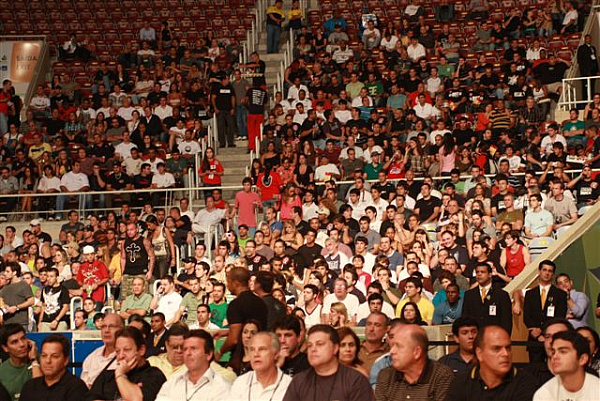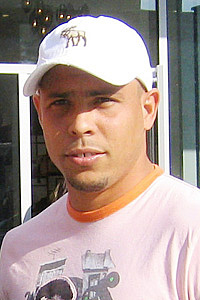Bitetti, Bando de Loucos and Brazilian MMA
Democracia Corinthiana
Guilherme Pinheiro Nov 25, 2010

The
crowd at Bitetti Combat 4: Marcelo Alonso | Sherdog.com
Soccer isn’t just Brazil’s most popular sport, it’s the tool by which all other sports are understood. Even in the home of vale tudo, MMA is understood on futebol’s terms.
Advertisement
Yet despite Brazil’s enormous and ongoing contributions to MMA, the sport’s reputation and profile still struggles inside the country itself. The nation is full of dedicated fight fans, but for much of the population, images of bloody vale tudo battles, event riots, and luta livre-versus-jiu-jitsu fights on the beach still mar the reputation of the sport, limit its visibility and moneymaking opportunities.
So, with Sport Club Corinthians Paulista partnering with Bitetti
Combat for
the promotion’s eighth event, taking place Dec. 4 at the club’s
stomping grounds, Alfredo Schurig Stadium in Sao Paulo, the
importance and potential for MMA growth in Brazil cannot be
overstated.
The Life and Times of “The Big Team”
A necessary history lesson: Corinthians was founded in 1910 by a group of workers from Sao Paulo; it’s working class roots made Corinthians known as the “people’s team” from its inception. To this day, Corinthians is still widely connected to the lower class. It’s the most popular club in Sao Paulo, and second only to Rio de Janeiro’s Clube de Regatas Flamengo in the whole country. However, amongst the working class, it’s number one by a fair margin.
The passion for Corinthians is something extraordinary; the team is referred to –- and not in jest -– as “The Almighty.” Indeed, Corinthians has followers, not supporters.
Famously, in 1976, Corinthians played Rio de Janeiro’s Fluminense in the Brazilian Championship semifinals. 70,000 Corinthians fans traveled the 280 miles by bus to watch the game, destroying any potential homefield advantage Fluminense would have had.
The match, known as “The Invasion,” was a 1-1 draw after full time. Corinthians went on to win dramatically in the penalty shootout. To this day, the Guinness Book of World Records considers it the greatest human displacement of people during peace time.
2010 is Corinthians’ 100th anniversary. While most clubs make a big deal of their centennial celebration, Corinthians’ profile is such that the celebrations actually started three years ago.

Splash News
the fortunes of Corinthians.
These changes paved the way for superstar Ronaldo to join Corinthians, a move that has seen the club’s TV ratings swell, despite already having the highest TV ratings in the country. Nearly half its games are now on national TV. The new level of exposure led to Corinthians signing a sponsorship deal for the 2010 season with Brazilian pharmaceutical giant Neo Quimica worth 38 million reais, or over $22 million USD. It led to an agreement for a new stadium, which will serve as the stadium for the 2014 World Cup opening match.
“Whatever Corinthians gets into, people want to know about,” says Bitetti Combat press agent Carlos Ozorio.
Spreading Democracia Corinthiana to MMA
It’s estimated that some 30 million of Brazil’s roughly 186 million citizens are Corinthians fans or “The Faithful” as they’re known. That estimation makes the team’s fanbase larger than the populations of Brazil’s neighboring nations Peru and Venezuela. So, it is not necessarily cliché to call Corinthians a nation. Its fans avidly consume whatever product has the name Corinthians on it.
“Our partnership with Corinthians is truly important for MMA to really take off in Brazil,” says event promoter Amaury Bitetti.
Bitteti Combat’s two-year deal works as follows: Bitetti and his team do the matchmaking and event production, while Corinthians brings the name -- and everything attached to it -- and the venue for the event. The club also assists the promotion with potential sponsors. Bitetti says he’s hoping to mobilize many of the club’s most important organized fan groups –- Corinthians is rich with dedicated fan sub-groups -- to get the word out about the event. He is hoping to prominently publicize the event at this weekend’s match against Rio de Janeiro’s Vasco da Gama.
“It’s great to see the No. 1 sport in Brazil surrender to MMA,” proclaims Pride veteran Cristiano Marcello, who will take on Argentina’s Guido Canetti on the Dec. 4 card. “But, I do think they need to find a way to broadcast the event in other countries; international sponsors are still avoiding Brazilian events.”
There is still some skepticism that the Corinthians-Bitetti cooperation will endure.
“Corinthians being involved with the sport can be beneficial to the sport, since people are starting to realize that MMA is the sport of the future,” says Marcos Barbosa, leader of Barbosa Jiu-Jitsu in Sao Paulo. “But, it might just be one event. Right now, there’s a lack of investment and people committed to the growth of the sport.”
Bearing this concern in mind, it is essential that everything goes as smooth as possible, especially given the media attention the event will receive because of Corinthians.
If anything goes awry -– and we know how things can go wrong in Brazilian events -– it could hinder MMA’s progress in Brazil.
MMA fans like to imagine that the sport is widely accepted in Brazil due to the amount of high-profile fighters the country produces. Unfortunately, it’s not the case, especially in metropolitan Sao Paulo, where the sport simply isn’t part of the culture the way it is in Rio.
“
gets into, people
want to know about.
”
As Barbosa alludes to, most MMA events in Brazil must rely solely on fight apparel companies, if any companies at all, for sponsorship dollars. When MMA has made it into the media in the past, it’s been for unfavorable incidents, such as the riot that took place at 1997’s Pentagon Combat in Rio. Incidents like this still impact the public perception of the sport, a major factor in preventing powerful, influential sponsors from getting involved.
This is why a successful relationship between Bitetti and Corinthians may prove formative, as Sao Paulo, Brazil’s financial capital, is the home of the big money backers that can make a difference in legitimizing MMA nationwide.
Related Articles







